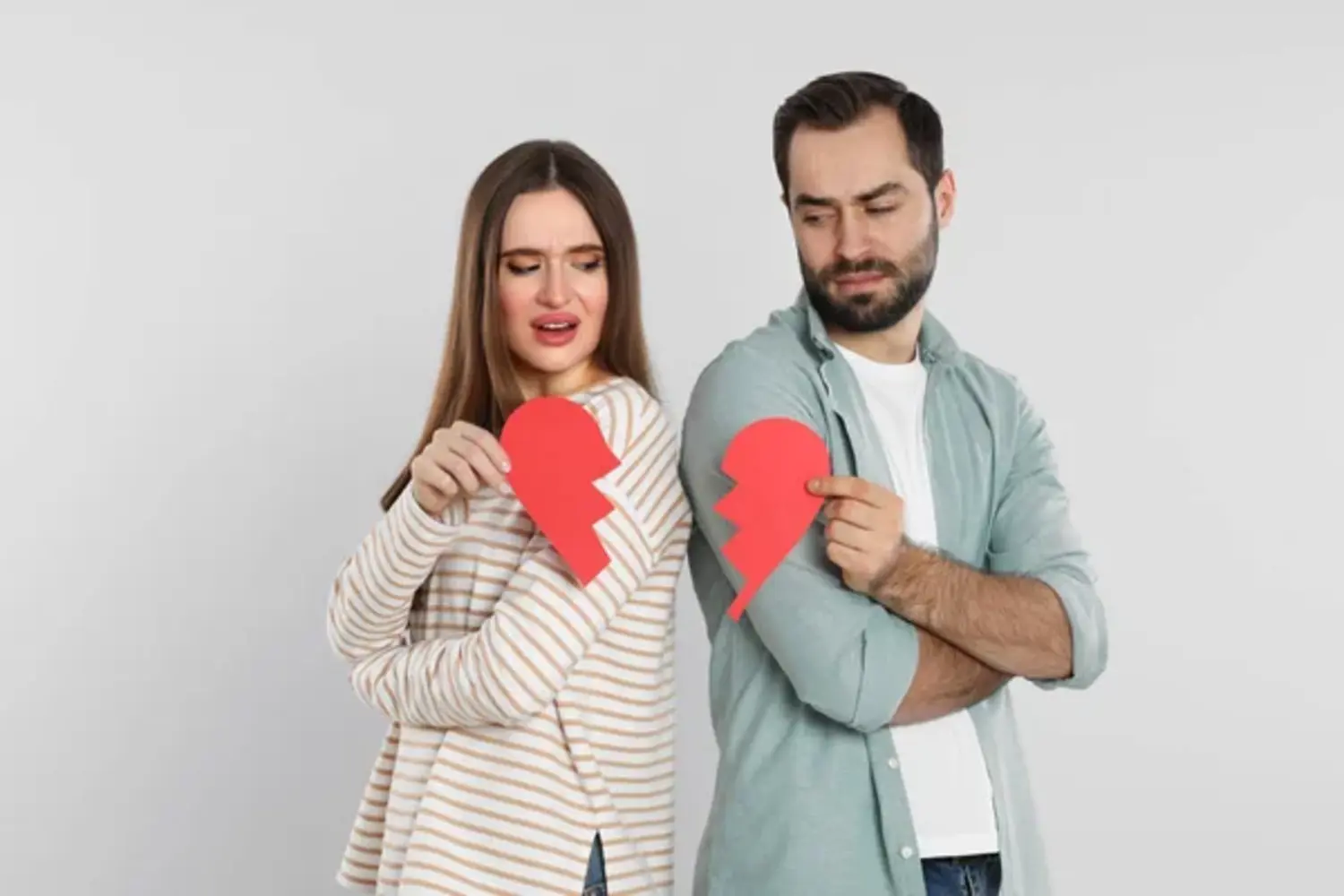In the labyrinth of love and relationships, we occasionally encounter those who leave behind a trail of emotional wreckage, leaving us bewildered and heartbroken.
It’s an unfortunate reality that some individuals possess a callous inability to empathize with the pain they inflict on others.
Like a haunting echo, the signs he is not sorry for hurting you reverberate in every interaction, shattering the illusion of remorse with each passing moment.
Are you ready to lift the veil of uncertainty and confront the signs he is not sorry for hurting you?
Brace yourself for an eye-opening expedition into the depths of human emotion, where empathy and remorse stand as stark differentiators between those who wound and those who heal.
Prepare to emerge stronger and wiser, armed with the knowledge to protect your heart and navigate the tumultuous waters of love with a newfound resilience.

Signs He Is Not Sorry For Hurting You
In the complex realm of relationships, there are moments when hurt and pain can be inflicted upon us by those we care for deeply.
However, what becomes even more disheartening is when the signs indicate that the person responsible for causing this pain is not remorseful for their actions.
Understanding the signs he is not sorry for hurting you can be a painful but necessary process in recognizing where you stand in the dynamics of the relationship.
As you navigate the emotional landscape, it’s crucial to recognize these signs and reflect on whether the relationship is one that fosters trust, understanding, and mutual respect.
Confronting the reality that he is not sorry for hurting you can be painful, but it can also serve as a catalyst for personal growth and the pursuit of healthier connections that prioritize emotional well-being.
signs of telepathic communication
Initial Communication
A. Frequency Of Text Messages
1. Increased Text Communication Over Time
When someone is genuinely sorry for causing you pain, they may initially give you space and time to heal. However, an unrepentant person will display an alarming pattern of increased text communication as time goes on.
They might flood your inbox with messages, seemingly trying to monopolize your attention and regain control over the situation.
This persistent behavior reveals a lack of consideration for your emotional well-being and an apparent disregard for the boundaries you may have set.
2. Initiation Of Conversations
A clear sign that he is not sorry for hurting you is the consistent initiation of conversations that revolve around trivial or mundane topics. Rather than addressing the issues that caused the pain in the first place, he avoids confronting the situation head-on.
This behavior showcases a desire to maintain a superficial connection without any genuine effort to make amends for his hurtful actions.
B. Length Of Messages
1. Transition From Short Responses To Longer, More Detailed Messages
As the unrepentant individual senses the impact of their hurtful behavior, they might attempt to manipulate you with a sudden change in the length and detail of their messages.
Long-winded explanations or declarations of affection may seem convincing at first, but upon closer inspection, you might discover a lack of sincerity and accountability.
This shift in message length is merely a ploy to keep you engaged and distract you from addressing the underlying issues.
2. Use Of Emoticons And Emojis
The use of emoticons and emojis can be quite telling in understanding someone’s emotional investment. While they can be genuine expressions of feelings in some cases, an unapologetic person might misuse them as a cover-up for their lack of remorse.
Emoticons can create an illusion of empathy without the need to truly understand or acknowledge the hurt they caused, leaving you grappling with unresolved emotions.
C. Prompt Responses
1. Indications Of Eagerness To Talk And Engage
An unrepentant person will demonstrate an eagerness to maintain constant communication, irrespective of the pain they’ve caused.
They may even appear overly enthusiastic or persistent in keeping the conversation alive, despite your attempts to create distance or seek closure.
This eagerness might stem from a desire to exert control over your emotions or to manipulate your perception of the situation.
2. Consistent And Timely Replies
When someone is genuinely sorry for hurting you, they often understand the gravity of their actions and the need for patience in earning back your trust.
However, an unremorseful person will consistently respond promptly, demonstrating a lack of consideration for your healing process and emotional boundaries.
This behavior can be an attempt to avoid accountability and maintain their position of power in the relationship dynamic.
Personal Sharing And Emotional Intimacy
A. Opening Up About Personal Life
1. Willingness To Share Experiences And Feelings
A clear sign that he is not sorry for hurting you is his unwillingness to open up about his personal life and emotions. A genuine apology often comes with an earnest desire to understand and connect with you on a deeper level.
However, unapologetic individual may keep their emotions guarded, avoiding any meaningful discussions about their own experiences and feelings. This lack of vulnerability can hinder emotional intimacy and prevent true healing from taking place.

2. Trust-Building Through Vulnerability
Building trust in a relationship requires both partners to be vulnerable and share their innermost thoughts and feelings. If he remains closed off and reluctant to reciprocate the level of vulnerability you offer, it can be a sign that he is not genuinely sorry for hurting you.
True remorse involves a mutual effort to understand each other’s perspectives, allowing emotional walls to come down and rebuilding trust through openness.
B. Seeking Emotional Support
1. Sharing Worries And Seeking Comfort
During difficult times, seeking emotional support from your partner is an instinct. However, an unapologetic person might only seek support when it benefits them, rather than reciprocating the care and comfort you offered during distress.
This one-sided approach demonstrates a lack of empathy and consideration for your emotional well-being, indicating that he may not truly regret his hurtful actions.
2. Offering Empathy And Understanding
A crucial aspect of remorse is the ability to empathize with the pain one has caused. When someone is genuinely sorry, they make sincere efforts to understand the emotional impact of their behavior on their partner.
On the contrary, an unapologetic person may show a lack of genuine concern for your emotions, dismissing or invalidating your feelings altogether. Their inability to offer empathetic support reveals a disconnect and further highlights their lack of remorse.
Genuine Interest And Active Listening
A. Asking Questions About Your Life
1. Demonstrating Curiosity And Investment
One of the signs that he is not sorry for hurting you is a lack of genuine curiosity about your life. A partner who truly cares will ask questions to understand your experiences, aspirations, and emotions on a deeper level.
However, an unapologetic person may exhibit disinterest in your life, making it apparent that they are more concerned about their needs and desires than building an emotional connection with you.
Their lack of investment in getting to know you better can be a red flag signaling a lack of remorse.

2. Remembering Details From Previous Conversations
Active listening and remembering details from your past conversations are indicators of genuine interest and care. When someone is sorry for causing you pain, they make an effort to remember important things about you.
On the contrary, an unremorseful person may repeatedly forget significant details about your life or previous discussions, demonstrating a lack of emotional investment and consideration for your feelings.
This forgetfulness may highlight their lack of interest in truly understanding you as an individual.
B. Engaging In Meaningful Discussions
1. Participation In Topics You Are Passionate About
A partner who is genuinely sorry for hurting you will actively discuss the topics that matter most to you. They recognize the significance of your passions and interests and show a willingness to participate, even if those subjects might not personally resonate with them.
However, an unapologetic individual may dismiss or belittle the things that bring you joy, undermining the emotional connection and revealing their lack of empathy and understanding.
2. Active Involvement In The Conversation
Meaningful discussions require active involvement from both partners. When someone is sorry for causing pain, they put effort into actively listening and contributing constructively to the conversation.
Conversely, an unremorseful person may exhibit signs of disinterest, impatience, or even interrupt you frequently during discussions.
Their lack of engagement and respect for your voice can indicate that they are not truly sorry for their hurtful actions and may be more focused on asserting their own opinions and desires.
Flirting And Playfulness
A. Use Of Compliments
1. Frequency Of Genuine Compliments
Compliments are a beautiful way to express admiration and appreciation for your partner. However, when he is not sorry for hurting you, the frequency of genuine compliments may diminish significantly.
Instead of using compliments as a sincere form of affection, he might employ them as a manipulation tactic or a way to distract you from the pain he caused.
The lack of genuine compliments could be a telling sign that his flattery is insincere, merely serving his selfish interests rather than fostering a true emotional connection.

2. Complimenting Physical Appearance And Personality Traits
An unapologetic person might focus primarily on superficial compliments, such as praising your physical appearance while neglecting to acknowledge your personality traits, values, or achievements.
True remorse involves recognizing and valuing the essence of who you are as a person, including your character, strengths, and accomplishments.
If he only compliments your looks without acknowledging your inner qualities, it may indicate that he is not truly invested in understanding and cherishing you as a whole.
B. Teasing And Inside Jokes
1. Playful Banter To Create A Bond
In healthy relationships, playful banter, and teasing can create a strong bond between partners, fostering a sense of intimacy and shared humor. However, when he is not sorry for hurting you, his teasing may take on a different tone.
Instead of being light-hearted and enjoyable, it might become hurtful, insensitive, or even manipulative.
Such behavior reveals a lack of sensitivity to your feelings and a failure to recognize the impact of his hurtful actions, leaving you feeling disrespected and emotionally distant.
2. Development Of Inside Jokes
Developing inside jokes can be a beautiful expression of a shared connection and unique experiences between partners. However, an unapologetic person might misuse inside jokes to dismiss or invalidate your feelings about the hurt they caused.
In doing so, they undermine the significance of your emotions, leaving you feeling unheard and unimportant.
True remorse requires empathy and a willingness to address the emotional consequences of one’s actions, not trivialize them through insensitive humor.
Long-Term Planning And Future Inclusion
A. Making Future Plans
1. Discussing Potential Activities To Do Together
When someone is genuinely sorry for hurting you, they often express a sincere desire to work on the relationship and plan future activities as a couple.
However, an unapologetic person might merely go through the motions of discussing future plans without actively investing in making them a reality.
They may use vague language or avoid committing to concrete plans, giving the illusion of long-term commitment while lacking the genuine intention to follow through.
This behavior could be a clear sign that they are not truly sorry and might be stringing you along without considering your emotions.

2. Mentioning Events Far In The Future With You Involved
Another way an unremorseful person might attempt to maintain the appearance of a committed relationship is by casually mentioning events or milestones in the distant future with you involved.
However, their lack of sincere remorse can be evident if these mentions are sporadic and not followed up with any concrete steps or actions. This behavior may lead to false hope, leaving you emotionally invested in a future that may never come to fruition.
B. Integrating You Into His Life
1. Inviting You To Events And Gatherings
When someone is truly sorry for hurting you, they often make an effort to integrate you into their life by inviting you to social events, family gatherings, and outings with friends.
This gesture showcases their willingness to demonstrate commitment and pride in having you as their partner.
On the other hand, an unapologetic person may keep you at arm’s length, avoiding introducing you to important people in their life or excluding you from significant events.
This exclusionary behavior can be a sign of emotional distance and a lack of genuine investment in the relationship.
2. Showing A Desire To Meet In Person
Physical presence and quality time together are essential for building emotional intimacy and strengthening a relationship. When he is not sorry for hurting you, he may show a lack of genuine interest in meeting you in person regularly.
He might make excuses or prioritize other activities over spending time with you, leaving you feeling undervalued and emotionally disconnected.
A lack of effort to physically be present can indicate that he is not committed to repairing the emotional damage caused by his hurtful actions.
Support and Encouragement
A. Being There During Tough Times
1. Offering Emotional Support And Encouragement
A partner who is truly sorry for hurting you will be there for you during difficult times, providing genuine emotional support and encouragement.
They will lend a listening ear, offer a shoulder to lean on and be willing to provide comfort and reassurance. On the other hand, an unapologetic person might be dismissive or emotionally distant when you’re going through tough times.
Their lack of empathy and support can leave you feeling isolated and emotionally unsupported, indicating that they may not genuinely regret their hurtful actions.
2. Demonstrating Care And Concern
During challenging moments, someone who is remorseful will actively show care and concern for your well-being.
They’ll inquire about your feelings, ask how they can help, and take proactive steps to alleviate your distress. Conversely, an unremorseful person may seem indifferent or detached, displaying little interest in your emotional state or well-being.
Their lack of genuine concern can be an alarming sign that they are not invested in helping you heal from the pain they caused.
B. Celebrating Achievements
1. Showing Excitement And Happiness For Your Success
A partner who is truly sorry for hurting you will celebrate your achievements and successes with genuine excitement and happiness.
They’ll take pride in your accomplishments and be your biggest cheerleader. On the other hand, an unapologetic person might be unsupportive or even envious of your achievements.
They may fail to share in your joy and success, displaying a lack of emotional generosity and a selfish attitude.
2. Acknowledging Milestones And Accomplishments
Acknowledging your milestones and accomplishments is a way for a remorseful partner to show that they value and appreciate you. They’ll recognize your efforts and express admiration for your hard work and dedication.
Conversely, an unremorseful person may downplay your achievements or neglect to acknowledge them altogether. This lack of acknowledgment can be hurtful and reveal their indifference to your personal growth and happiness.
Emojis, Emoticons, And Gifs
A. Frequency And Type Of Emojis Used
1. Emojis That Indicate Affection And Love
Emojis can be powerful tools to convey emotions and sentiments. When someone is truly sorry for hurting you, they may use affectionate emojis like hearts, kisses, and hugs to express their love and remorse.
These emojis are usually accompanied by heartfelt messages and sincere efforts to repair the emotional damage.
However, an unapologetic person may use affectionate emojis as a means to manipulate or placate you without genuinely addressing the root cause of the hurt.
Their excessive use of such emojis may lack authenticity and depth, leaving you questioning the sincerity of their feelings.
2. Use Of Unique Emojis And Emoticons
The use of unique and personalized emojis or emoticons can be endearing and reflective of an intimate connection. In a remorseful relationship, partners may develop their own set of inside emojis or use creative emoticons to convey nuanced feelings.
Conversely, an unapologetic person may be less likely to engage in such personalized interactions.
Their limited use of unique emojis might signify a lack of emotional investment and a failure to foster a deeper bond based on shared experiences and understanding.
B. Sending GIFs And Memes
1. Sharing Humorous Content To Make You Smile
Sending GIFs and memes that evoke laughter and joy is a delightful way to bring positivity to a relationship. A partner who is truly sorry for causing you pain will make genuine efforts to lighten your mood and bring a smile to your face.
They’ll choose content that aligns with your sense of humor and preferences, demonstrating a sincere understanding of what makes you happy.
Conversely, an unapologetic person may use humor to deflect from the hurt they caused or to distract you from addressing the real issues. Their choice of content may lack consideration for your emotions, leaving you feeling unheard and emotionally distant.
2. Expressing Feelings Indirectly Through GIFs
Sometimes, GIFs can be used to express feelings and emotions indirectly, especially if someone finds it challenging to communicate openly about sensitive topics.
However, when he is not sorry for hurting you, he might resort to sending GIFs as a way to avoid genuine emotional conversations. Instead of addressing the hurt directly, he may use GIFs to create a façade of emotional connection without delving into the deeper issues.
This indirect communication can be a sign of emotional avoidance and a lack of true remorse.
Continuity And Consistency
A. Maintaining Contact Over Time
1. Consistent Texting Without Significant Lapses
When someone is genuinely sorry for hurting you, they understand the importance of maintaining communication and connection.
They will make an effort to be consistent in their texting, ensuring that there are no prolonged periods of silence or unexplained gaps in communication.
On the other hand, an unapologetic person may show inconsistency in their texting behavior, leaving you feeling uncertain and emotionally neglected.
Their failure to prioritize consistent communication may indicate a lack of remorse and emotional investment.
2. Demonstrating Commitment To The Conversation
Continuity in communication involves not only responding consistently but also showing commitment to the quality of the conversation.
A remorseful partner will actively engage in discussions, ask thoughtful questions, and show genuine interest in what you have to say. They will prioritize active listening and make an effort to understand your perspective and emotions.
Conversely, an unremorseful person may exhibit disinterest or provide shallow responses during conversations, leaving you feeling unheard and undervalued.
B. Showing Effort In Communication
1. Initiating Conversations Even During Busy Times
An essential sign of a remorseful partner is their willingness to make an effort in communication, even during busy or challenging times.
They will prioritize staying connected with you and will find moments to reach out, showing that you are a priority in their life. On the contrary, an unapologetic person may use their busy schedule as an excuse to avoid engaging with you.
Their lack of effort in initiating conversations can be hurtful, leaving you feeling unimportant and emotionally distant.
2. Taking Time To Respond Thoughtfully
In a remorseful relationship, partners take the time to respond thoughtfully to each other’s messages, especially when discussing sensitive or emotional topics.
They value effective communication and put effort into articulating their thoughts and feelings. However, an unremorseful person may rush their responses or reply with dismissive remarks, showing a lack of emotional investment and consideration for your feelings.
Their failure to respond thoughtfully can be indicative of their indifference to your emotions and the hurt they caused.
Conclusion
In the end, navigating the complexities of love and hurt demands courage and vulnerability, but it is through this journey that you discover your resilience and capacity for self-love.
By recognizing the signs, you embark on a path of self-discovery and transformation, paving the way for a future where your heart is treasured and your emotional well-being is cherished above all else.

Hi, I’m Jasmine Sophie and welcome to my website!
As a marriage counsellor, I’m passionate about helping people figure out solutions to their relationship issues. While based in Austin and with most of my clients coming from the local area, I believed that there were more people out there who could benefit from my services.
That’s why I decided to set up this webiste; so that I can help even more people break through any difficulties they may be facing in their relationships. In my free time, I enjoy activities like golfing and fishing, as well as just spending time with family. It’s just another way for me to explore my creativity and use it towards helping others.
Experience:
With a wealth of experience in the realm of love and relationships, Jasmine has been transforming lives for over a decade. Her remarkable journey as a licensed psychologist and marriage and couples therapist has allowed her to witness the transformative power of love firsthand. Through her extensive work with diverse couples, she has unraveled the secrets to fostering healthy and thriving partnerships.
Expertise:
Jasmine’s expertise lies in untangling the complex web of relationship dynamics. Whether it’s reigniting the spark in long-term marriages, healing wounds from past relationships, or guiding individuals in their pursuit of true love, Jasmine possesses an unwavering commitment to helping people create fulfilling and joyful connections. Her profound insights and practical strategies have earned her accolades as a trusted authority in the love and relationship sphere.
Education:
Jasmine Sophie’s academic achievements serve as a solid foundation for her exceptional knowledge in the field. She holds a master’s degree in Psychology, specializing in marriage and family therapy. Combining her academic prowess with her empathetic nature, Jasmine seamlessly integrates evidence-based techniques and profound wisdom to empower her readers to navigate the complexities of modern relationships with grace and authenticity.
Join Jasmine Sophie on joypassiondesire.com, and embark on a transformative journey to embrace love, ignite passion, and cultivate relationships that transcend ordinary boundaries. Through her illuminating articles and expert guidance, she will empower you to create a love story that is worthy of celebration and admiration. Get ready to embark on an extraordinary adventure of love and self-discovery with Jasmine Sophie as your trusted guide.